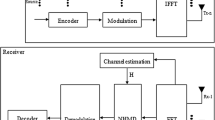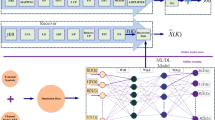Abstract
Channel Estimator plays an important role in reducing the error rate in wireless communication system. Conventional channel Estimators consumed high power consumption due to their complex design architectures. In this paper, a simple low power and high efficient channel Estimator for multi input multi output-orthogonal frequency division multiplexing system has been designed in order to reduce the error rate in the receiver side of the communication system. The performance of the proposed channel Estimator is analyzed interms of signal to noise ratio, bit error rate, power and current consumptions. The proposed low power channel Estimator architecture had been tested with different very large scale integration processors to validate their performance.





Similar content being viewed by others
References
Lin, J.-C. (2008). Least-squares channel estimation for mobile OFDM communication on time-varying frequency-selective fading channels. IEEE Transactions on Vehicular Technology, 57(6), 3538–3550.
Lin, R., & Petropulu, A. P. (2005). Linear precoding assisted blind channel estimation for OFDM systems. IEEE Transactions on Vehicular Technology, 54(3), 983–995.
Zeng, Y., Lam, W. H., & Ng, T. S. (2006). Semiblind channel estimation and equalization for MIMO space-time coded OFDM. IEEE Transactions on Circuits and Systems I, 53(2), 463–473.
Zhang, W., Gao, F., Minn, H., & Wang, H. M. (2017). Scattered pilots-based frequency synchronization for multiuser OFDM systems with large number of receive antennas. IEEE Transactions on Communications, 65(4), 1733–1745.
Jain, H., & Nandal, V. (2016). A comparison of various channel estimation techniques to improve fading effects in MIMO over different fading channels. International Journal of Current Engineering and Technology, 6(4), 1382–1386.
Faradina, N. & Iskandar (2016). Pilot based LS channel estimation for downlink HAPS channel. In 2016 international symposium on electronics and smart devices (ISESD), Bandung, Indonesia (pp. 355–359).
Bharwad, D., & Christian, A. (2015). Channel estimation techniques for LTE downlink. International Journal of Advance Engineering and Research Development, 2(5), 1513–1519.
Sumathi, K., Ayesha, M., & Kaja Mohideen, S. (2015). An improved method of MIMO-OFDM channel estimation using chaotic pilot sequence. ARPN Journal of Engineering and Applied Sciences, 10(8), 3544–3549.
Singh, H., & Khurana, I. (2014). Enhanced adaptive channel estimation technique for MIMO-OFDM wireless systems. International Journal of Computer Applications, 94(20), 29–33.
Raissawinda, R., Puja Astawa, G., Moegiharto, Y., Zainudin, A., & Dui Agusalim, I. (2014). Channel estimation design of MIMO-OFDM systems using MMSE for IEEE 802.11N WLAN standard. European Scientific Journal, 10(6), 137–146.
Author information
Authors and Affiliations
Corresponding author
Additional information
Publisher's Note
Springer Nature remains neutral with regard to jurisdictional claims in published maps and institutional affiliations.
Rights and permissions
About this article
Cite this article
Immanuvel, A., Suganthi, M. Performance Analysis of Low Power Channel Estimator for Multi User MIMO-OFDM System. Wireless Pers Commun 107, 341–350 (2019). https://doi.org/10.1007/s11277-019-06258-5
Published:
Issue Date:
DOI: https://doi.org/10.1007/s11277-019-06258-5




